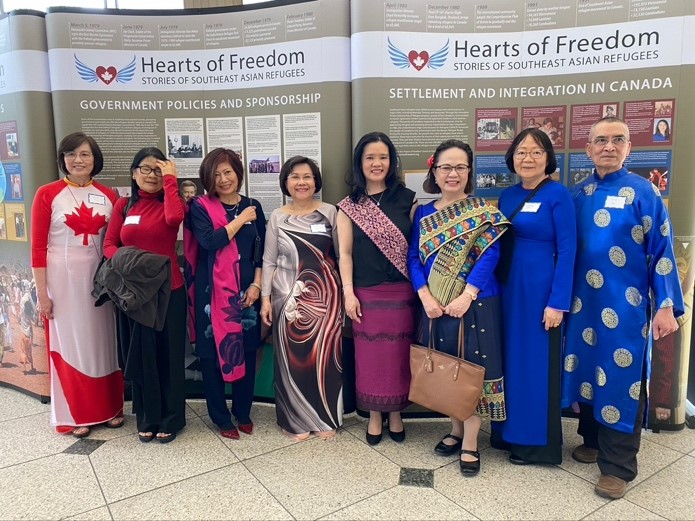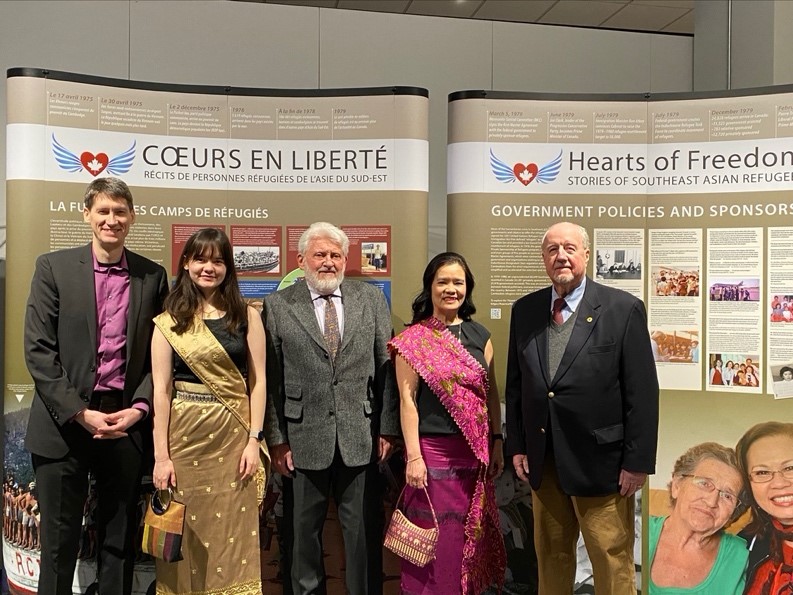In 1986, the people of Canada were awarded the Nansen Medal, in recognition of their exceptional contribution to refugee protection, by the United Nations High Commissioner for Refugees (UNHCR). This is the only time that the Nansen Medal has ever been awarded to the people of a country. This honor was bestowed on the people of Canada for their contribution in welcoming and resettling thousands of refugees from Southeast Asia in the late 1970s and early 1980s. It was the first time that the Canadian Government applied the Private Sponsorship of Refugees Program that provided an opportunity for community groups, associations, and even groups of five individuals to sponsor refugees to resettle in Canada. The wars raging in Vietnam, Laos, and Cambodia led to millions of people fleeing these countries and seeking asylum abroad. In just one year, 1979 to 1980, Canada welcomed 60,000 Indochinese refugees, 26,000 were government sponsored and 34,000 were privately sponsored. Between the 1970s and 1990s, Canada continued to welcome Vietnamese, Laotian, and Cambodian refugees with over 200,000 arriving during that time, the highest rate per capita among all the countries that were accepting such refugees. This period in Canada’s history has been described as being a turning point in its immigration policy and the positive humanitarian response by Canadians reflected a change in attitude towards refugees.
The Hearts of Freedom – Stories of Southeast Asian Refugees exhibit commemorates the lives of all those Southeast Asian refugees who resettled in Canada during the tumultuous war-torn period of the Vietnam War, the Cambodian Genocide, and the Laotian Civil War, which led to the Communist takeover of these countries. The Passage to Freedom documentary film is based on the HOF interviews of many of those who escaped the horrors in these countries and made their way, first, to refugee camps in Hong Kong, Thailand, Malaysia, Indonesia, and the Philippines before being resettled to Canada.
The creator and curator of the Hearts of Freedom exhibit is Dr. Stephanie Phetsamay Stobbe at Canadian Mennonite University, Winnipeg, Manitoba, who is also currently the President of the Canadian Association for Refugees and Forced Migration Studies (CARFMS). Professor Stobbe has been touring her exhibit and film across Canada in places as the Senate of Canada in Ottawa, the Canadian Museum of History in Gatineau, the Canadian Immigration Museum at Pier 21 in Halifax, the Manitoba Museum in Winnipeg, and different university campuses and venues. The HOF – Stories of Southeast Asian Refugees exhibit will be on display at York University’s Osgoode Hall Law School Library, main entrance, from September 13th to October 14th, 2024. The Passage to Freedom documentary will be screened at the official opening of the exhibit at the Helliwell Centre, Osgoode Hall Law School, York University, on Tuesday, September 24th, 10:00 am to 3:00 pm. Everyone is welcomed to attend this free event.
The exhibition was curated by Professor Stephanie Phetsamay Stobbe, Canadian Mennonite University, Winnipeg, Manitoba. She will be one of the principal guest speakers at the official opening ceremonies on the 24th of September and take everyone there on a guided tour of the exhibition and discuss the documentary film. Professor Stobbe is the current President of the Canadian Association for Refugees and Forced Migration Studies (CARFMS). And, most importantly, she was one of the many thousands of Southeast Asian refugees who arrived in Canada as a young child with her family. Stobbe shared, “It is remarkable that all those Southeast Asian refugees who arrived in Canada during the 1970s and 1980s quickly adapted to their new country and have made outstanding contributions to Canadian society. Many Canadians are unaware of their individual stories of resilience and how they enriched Canadian society in so many ways. Our exhibition and documentary film help to educate Canadians about this very important period in their country’s history.” The exhibition and documentary film have made their way across Canada and were recently displayed at the Senate of Canada, the Canadian Museum of History, the Canadian Immigration Museum at Pier 21, Manitoba Museum, Hamilton City Hall, and a number of university campuses and other venues. “It is wonderful to see how well our exhibition and film have been received and celebrated right across Canada,” states Stobbe.
The HOF exhibit and accompanying documentary also has close ties to York University. The late Dr. Howard Adelman, a distinguished philosopher at York University’s Department of Philosophy, was the founder and head of Operation Lifeline that brought thousands of Southeast Asians to Canada through the Canadian Private Sponsorship of Refugees Program in the 1970s and 1980s. Professor Adelman went on to establish the Centre for Refugee Studies (CRS) at York University, which is one of the world’s leading research centers of its kind. Each year the CRS holds its annual Howard Adelman Lecture in honor of its founding Director and one of the most influential and distinguished academics in the field of refugee studies. Professor Adelman was not only an early pioneer in the new discipline of refugee studies but one of its most influential scholars, activists, and policymakers. There will be an opportunity to recognize Professor Adelman’s contributions to York University and Canadian society at the official open of the Hearts of Freedom – Stories of Southeast Asian Refugees exhibit and Passage to Freedom film screening.
All York University community members are welcomed to attend the official opening of the Hearts of Freedom – Stories of Southeast Asian Refugees exhibition and Passage to Freedom film screening on Tuesday, September 24th, 10:00 am to 3:00 pm, at the Helliwell Centre, Osgoode Hall Law School, York University. To reserve your free ticket, click on the link https://bit.ly/3AFVr9c.
For more information, please see the Hearts of Freedom website https://heartsoffreedom.org/.
If you have any questions, please contact, Michele Millard, Coordinator, Centre for Refugee Studies (CRS), York University, at mmillard@yorku.ca.












